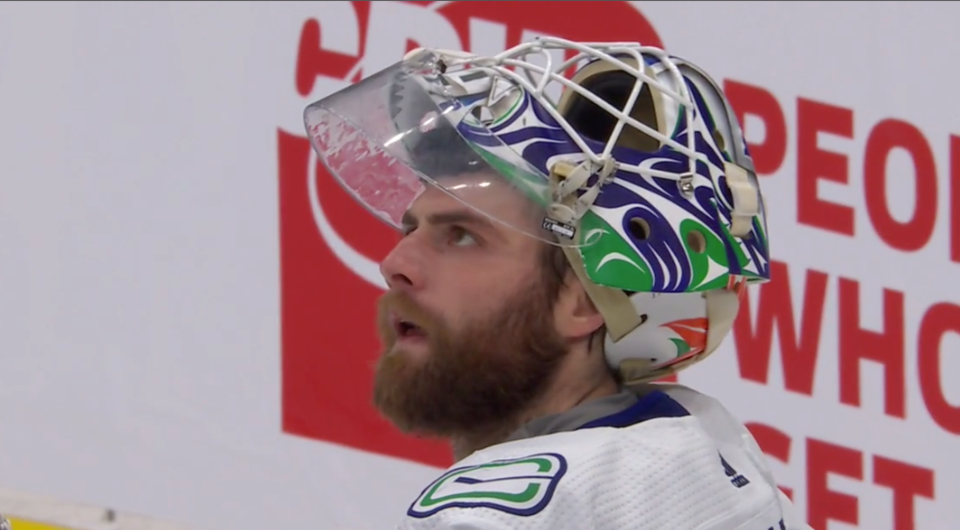What’s wrong with the Vancouver Canucks? There’s no shortage of theories.
One is that head coach Travis Green has “lost the room,” meaning players are starting to tune out his instructions. If the players are following his system and not seeing results, the theory goes, then why would they trust his direction? In this theory, it certainly doesn’t help that Green is a “lame duck” coach, in the final year of his contract with no sign of when, or if, it will get renewed.
Another, perhaps more popular, theory is that the team has quit on general manager Jim Benning. That’s the theory of former Canucks defenceman Brent Sopel, who chimed in on Twitter.
Last season, the Canucks were a playoff team, with a close-knit group that believed they were on the verge of something special. In the offseason, key members of that group left in free agency and reportedly felt disrespected on their way out the door. Benning’s excuse that he “ran out of time” to re-sign Tyler Toffoli after the winger lit up the Canucks was particularly exasperating.
By extension, perhaps the players have given up on ownership. After all, they can see firsthand the financial cuts the team has made to staff.
At this point, however, it doesn’t matter. The Canucks need to block out all those distractions. Forget about playing for their coach, GM, owner, or even the fans, who are unable to attend games anyway. They need to focus on playing for each other.
Braden Holtby, J.T. Miller, and accountability
On Saturday night against the Toronto Maple Leafs, J.T. Miller gave a demonstration of the opposite and got remonstrated by Braden Holtby for it.
View post on imgur.com
“What was said on the ice will stay on the ice,” said Holtby after the game. “That’s a play I’ve made a lot before, but I think it’s not just that play, I think it’s a lot of things to just try to get on the same page. That doesn’t start anywhere else except for individually and I think that is on me to make sure that we get on the same page in things like that.”
On Monday morning, Miller addressed the moment, first echoing Holtby’s sentiment that, like Vegas, what happens on the ice stays on the ice. At the same time, he admitted his own culpability for the goal.
“A lot of that goal happens because I’m not moving my feet,” said Miller. “I don’t think there’s anything wrong with holding your teammates accountable, I think that happens a lot on good teams.”
“We have to take a good look in the mirror and raise our game and our standards and put it to the ice,” he added.
According to Holtby, accountability is key for the Canucks to break out of their funk.
“I think the only way to get out of it is to get back to work, hold ourselves accountable individually and as a team, and find a way to get on the same page,” he said. “We’re a disconnected group right now and it’s showing.”
In other words, the Canucks need to be accountable to each other. On the ice, every mistake, every lapse in concentration, and every blown assignment affects everyone else on the team. Conversely, when the team game comes together, that lifts up each individual player.
“I think for our group, everyone’s game will improve individually if we play better collectively,” said Green. “If our team game is stronger, our individual game will improve as well. [Miller] is probably one of the guys that will benefit from that. If we turn over more pucks on the forecheck, it’s going to help offensive players. If we break the puck out cleaner, it’s going to help offensive players as well.”
Mistakes in those areas particularly affect goaltenders. The Canucks have repeatedly hung Holtby and Thatcher Demko out to dry this season with turnovers and defensive breakdowns. It’s no wonder Holtby gave Miller a piece of his mind on Saturday — he’s been getting shelled all season.
At the same time, Holtby and, to a lesser extent, Demko have also let their teammates down at times. As much as they’ve had to face innumerable breakaways, odd-man rushes, and defensive breakdowns, the two goaltenders also haven’t come up with the big save that inspires confidence in the rest of the team.
Accountability doesn't work if the call comes from the wrong person. If the player calling for accountability isn’t holding up their own end of the bargain, they risk being called out for hypocrisy.
This is where leadership by example comes into play. When the player calling for accountability is walking the walk, it’s a lot easier to follow his lead. That applies to Miller, whose commitment to detail has been lacking this season. Last season, Benning praised Miller for his leadership.
“The one thing that [Miller]’s exceeded my expectations in is the leadership that he's brought in the room with our younger players,” said Benning. “He’s mentored some of them and helped them along their path.”
Miller needs to show leadership once again and lead by example. As much as he is frustrated with his own play and with that of the team, it’s time for him to stow that frustration away and show a full 60-minute commitment to every aspect of the game.
“The reality is, sometimes you’re never as good as you think you are, but sometimes you’re not as bad as you think you are,” said Green. “I don’t think Millsy’s game is far off from where his top end is and I think also there’s that leadership part and how he takes upon himself. He’s still relatively young in that department and he’s learned to emotionally handle it.”
That means no giving up on plays because of a mistake and no giving up on games because the score gets away from them. It’s time for the Canucks to play for each other and forget everyone else.



